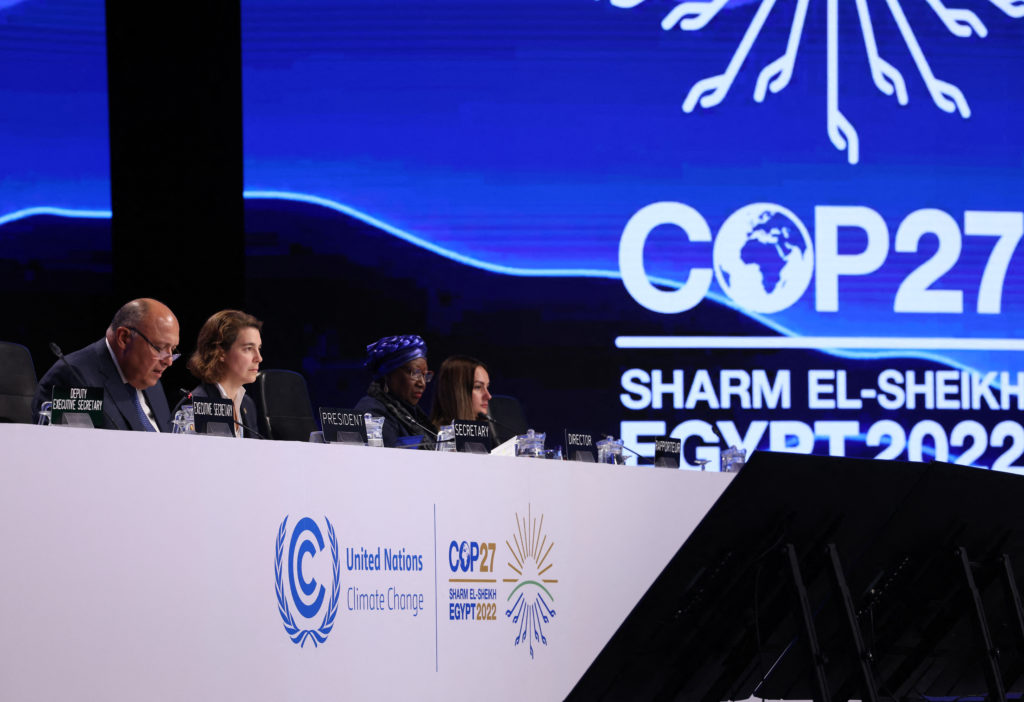After a delay of a day and a half, countries at the latest UN Climate Change Conference (COP27) in Egypt finally reached an agreement on a funding mechanism to compensate vulnerable nations for "loss and damage" from climate disasters. Still, no progress was made on other key points, such as an exit from all fossil fuels.
Just over 05:00 on Sunday morning, COP27 President Sameh Shoukry, who is also the Foreign Minister of Egypt, announced that participants had agreed on a final declaration, after missing the Friday night deadline.
"The world is watching, I call on us all to rise to the expectations entrusted to us by the global community, and especially by those who are most vulnerable and yet have contributed the least to climate change," he said.
Agreements were reached on setting up a "loss and damage" fund by the next COP in 2023, as well as on the post-2025 finance goal and the so-called 'mitigation work programme' that would reduce emissions faster, catalyse impactful action, and secure assurances from key countries that they will take immediate action to raise ambition and "keep us on the path towards 1.5°C."
"COP27 has taken an important step towards justice. I welcome the decision to establish a loss and damage fund and to operationalise it in the coming period," UN Secretary-General António Guterres said in a video message.
Vulnerable countries – such as Pakistan, which suffered from enormous floods this year – have been asking for such a fund for decades; they are the first to feel the effects of climate change. However, the United States and the European Union, among others, have long held back the creation of such a fund.
"Clearly this will not be enough, but it is a much-needed political signal to rebuild broken trust," Guterres added, stressing that the UN system will support the effort every step of the way.
While the agreement was seen as "a welcome step in the right direction," there was little forward movement on other key issues, particularly the phasing out of fossil fuels. Participants also called for a "rapid" reduction in greenhouse gas emissions and reaffirm the target of limiting global warming to 1.5°C – in an agreement that is nearly an exact copy of the one reached at the Glasgow climate conference last year.
No clear language on reducing emissions
"We need to drastically reduce emissions now – and this is an issue this COP did not address," Guterres stated, saying that the world still needs to make a giant leap on climate ambition, and to end its addiction to fossil fuels by investing “massively” in renewables.
Observers have also warned that new language including “low emissions” energy alongside renewables as the energy sources of the future is a significant loophole, as the undefined term could be used to justify new fossil fuel development against the clear guidance of the UN Intergovernmental Panel on Climate Change (IPCC) and the International Energy Agency (IEA).
Frans Timmermans, in charge of the European Green Deal and Commissioner for Climate Action Policy, could not hide his disappointment. “If we do not speed up, we are heading towards 2.4°C and that is not acceptable. I am sorry if I spoil the atmosphere for some people but it needs to be said.”
Related News
- Flemish Minister blasts EU concession at COP27 on loss and damage
- COP27: Is the summit still fit for purpose?
- Flemish Environment Minister to skip COP28 and takes a dig at Dubai
Guterres also reiterated that reducing global greenhouse gas emissions and keeping alive the Paris Agreement’s 1.5°C limit remain the priorities to pull humanity "back from the climate cliff." The Chair of the official delegation from the European Parliament, Bas Eickhout, also stated that Europe "had to fight to the end to maintain last year's ambition, but this is insufficient if we want to meet the climate goals."
"I can therefore only conclude that 2022 has been a lost climate year. Still, on ‘loss and damage’, the EU showed leadership and broke the deadlock by declaring itself in favour of a fund. As a result, the COP achieved something after all," he added.
Other organisations, such as the World Wildlife Fund (WWF), stated that the world cannot afford another COP like this one that does not increase ambition, funding and credibility. "It is unacceptable that negotiators failed to reach a more ambitious agreement than the one reached in Glasgow last year."
'Fund for the end of the world'
Manuel Pulgar-Vidal, global head of climate and energy at WWF, and chair of COP20, said that while the agreement on loss and damage is a positive step, it risks becoming a "fund for the end of the world" if countries do not act faster to reduce emissions and limit warming to less than 1.5°C.
"By failing to agree on the phase-out of fossil fuels at COP27, leaders missed the opportunity to accelerate the phase-out of fossil fuels, leaving us on the path to climate catastrophe," he stressed. "Without rapid and deep emissions reductions, we will not be able to limit the scale of losses and damage."
Therefore, Pulgar-Vidal stressed that future COP presidencies should not miss this opportunity and governments must redouble their efforts to reduce emissions and take the transformative measures needed to keep warming below 1.5°C. "Next year's COP28 climate summit must become the COP of climate credibility. And countries must honour their commitments."

